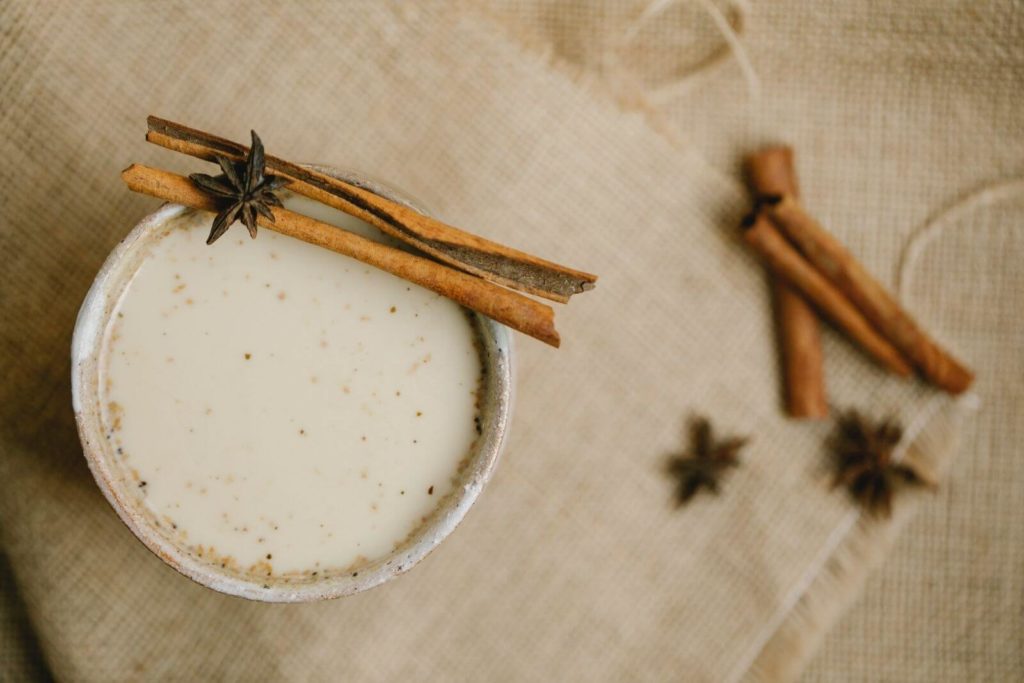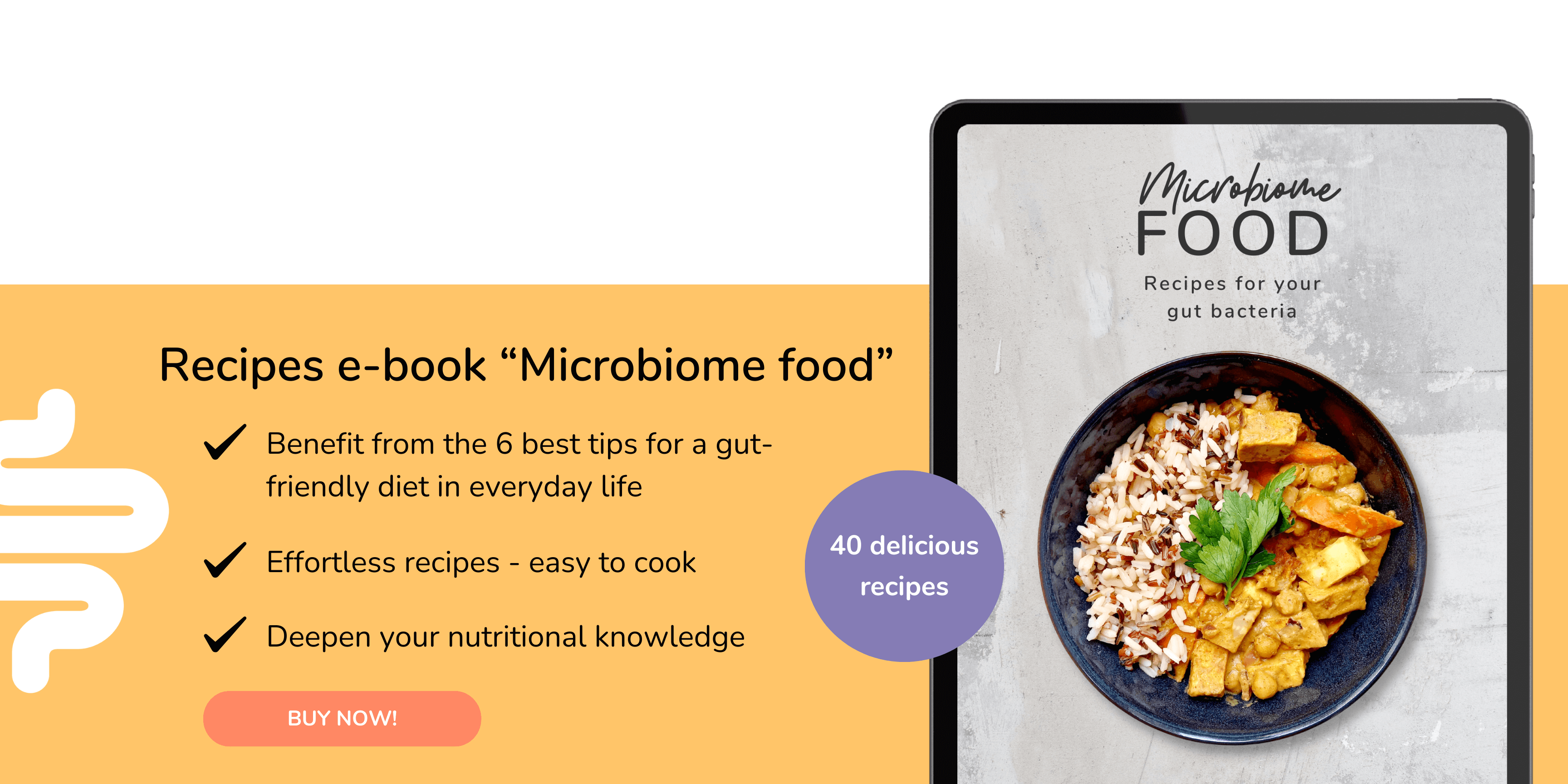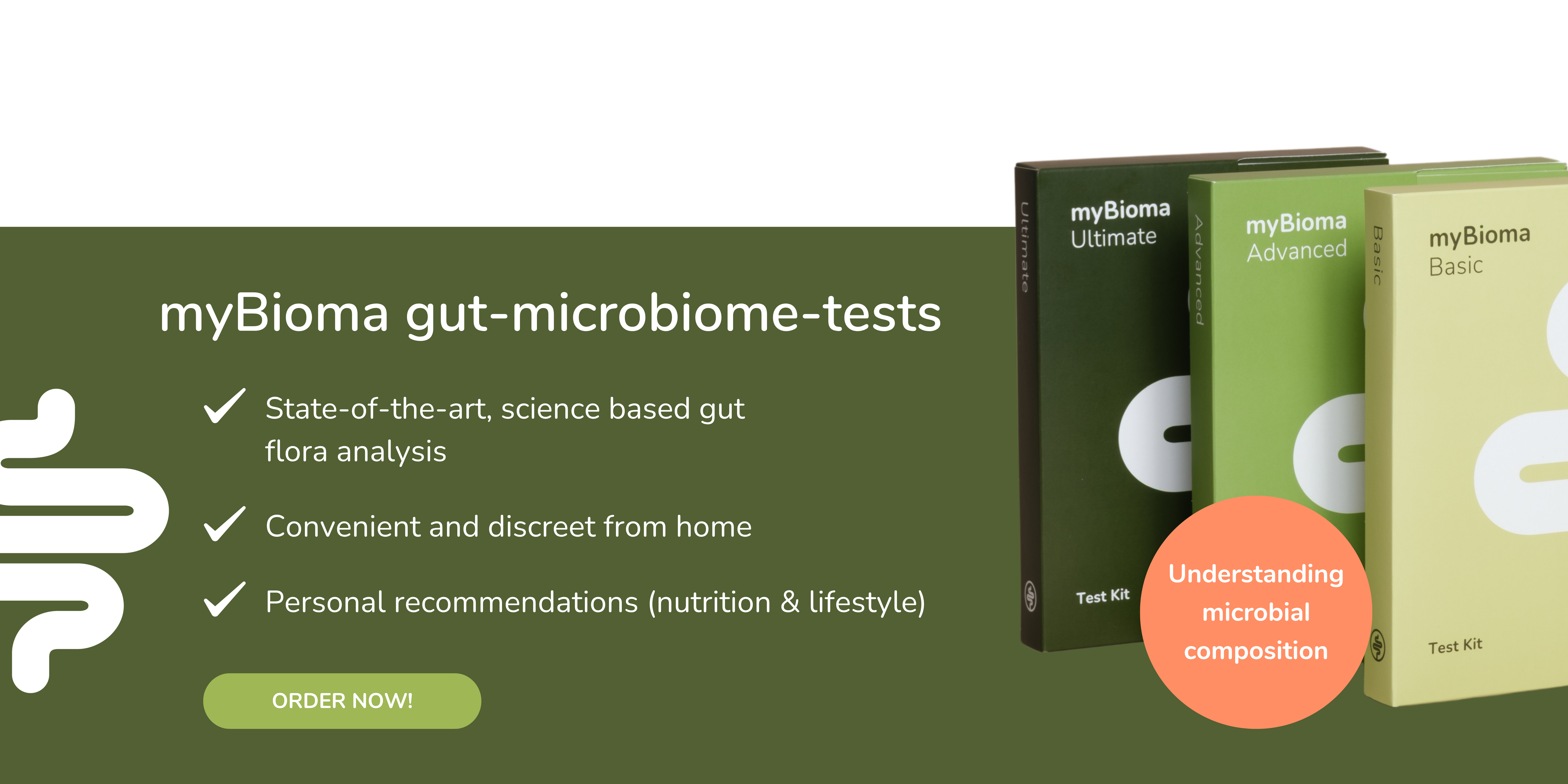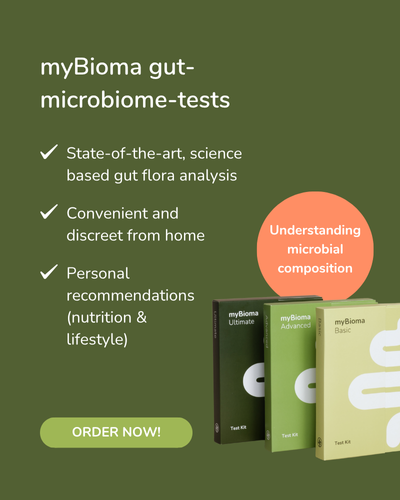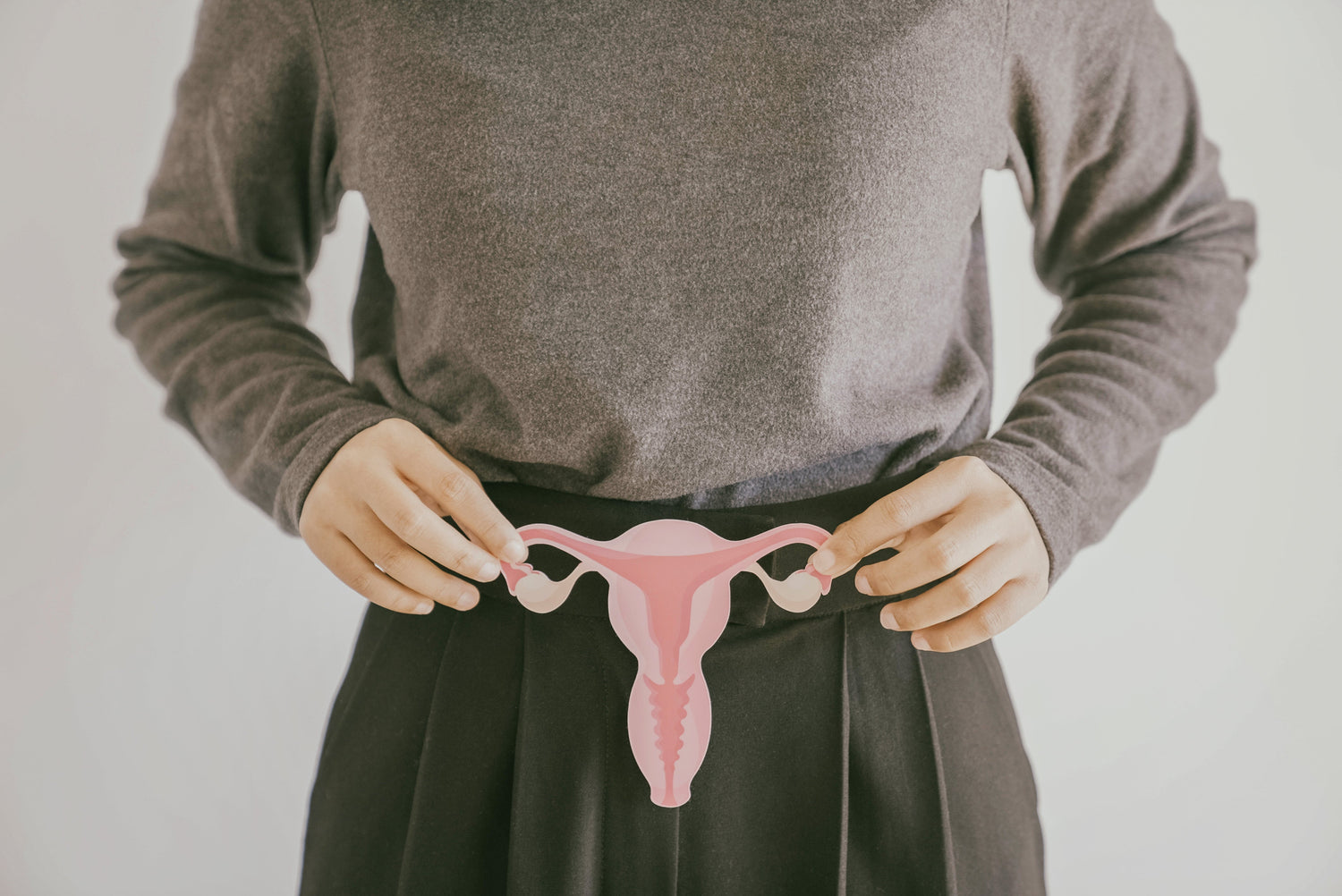You may have heard or read about Moon Milk. Besides trendy drinks like chai latte and golden milk , moon milk has its roots in Ayurvedic medicine. In Ayurveda (one of the oldest natural healing systems in the world), warm milk is considered a common remedy for insomnia .
What is Moon Milk?
Moon Milk is a warm drink that is best consumed shortly before going to sleep. The ingredients of the milk have a calming and stress-reducing effect on the body. This is primarily due to the spice ashwagandha, which is also known as the sleeping berry. One study even found that ashwagandha can have a positive effect on the bacterial composition of the gut microbiome (1). Ashwagandha has its roots in India and Africa. In our latitudes you can buy it e.g. in health food shops or organic food shops. Besides Ashwagandha, Moon Milk consists of other health-promoting ingredients such as milk, turmeric, cinnamon, nutmeg, vanilla and honey.
Moon Milk Recipe – How it works
Traditionally, cow’s milk is used in Ayurvedic cooking, but if you want to avoid dairy products, you can also use a plant-based (vegan) option such as oat milk, almond milk or cashew milk. We tried oat milk because it already has a natural sweetness. You can vary the spices as you like. With turmeric, for example, the milk turns yellow, with lavender you get a beautiful purple moon milk.
By the way: Did you know that a plant-based diet can help to increase the beneficial gut bacteria? Find out more!
 Moon Milk has a calming and stress-reducing effect on the body.
Moon Milk has a calming and stress-reducing effect on the body.
The ingredients
-
250 ml oat milk
-
1 pinch of cinnamon
-
1 pinch of nutmeg
-
1/2 vanilla pod
-
1 tsp honey
-
1 tsp ashwagandha
-
Optional: Other spices, such as turmeric or lavender
Instructions – How to make your Moon Milk
The Moon Milk is quick and easy to prepare. We recommend drinking the milk right before going to bed because of its relaxing effect.
-
Heat the oat milk in a small pot.
-
Add the cinnamon and nutmeg, stirring constantly.
-
Cut the vanilla pod in half, remove the pith and stir it into the milk.
-
Add the honey and the most important ingredient Ashwagandha, the milk should not boil.
-
Stir well and let your Moon Milk cool down a little.
-
Find a cosy spot and enjoy your Moon Milk
The benefits of Moon Milk
Besides the already mentioned calming effect of Ashwagandha, the other ingredients also have health-promoting effects for our body.
Honey: There are numerous studies on the antimicrobial components and health effects of honey. Honey is a prebiotic food and supports your bacteria through the fibres and nutrients it contains, as these play an essential role in the regeneration of your intestinal mucosa. (2)
Cinnamon: Promotes good bacteria and hinders bad ones. Cinnamon contains many antioxidants that can bind free radicals and support your metabolism at the same time. The flavonoid proanthocyanidin found in cinnamon can stimulate fat cells to release insulin, lowering your blood sugar levels. In addition, cinnamon can help support digestion and minimise the risk of irritation of the digestive tract. (3,4)
Turmeric: The ingredient “curcumin” has antioxidant and anti-inflammatory effects. Turmeric stimulates gastric juice and bile acid production and thus supports digestion. (5)
Ashwagandha: The positive effect of ashwagandha was confirmed in a study published in the journal Medicine in September 2019. The study examined the stress-reducing effect of ashwagandha on healthy people. It was shown that ashwagandha supplementation significantly reduced stress parameters. (6)
If you’re looking for inspiration for more gut-friendly recipes, feel free to keep checking out our blog .
Why sleep is so important for the gut microbiome
Sleep and the gut microbiome influence each other. Studies have shown that a higher diversity of the gut microbiome can have a positive effect on sleep and also reduce the frequency of waking during sleep. Research has even been able to associate certain types of bacteria with better or worse sleep quality. Bacteria that improve sleep include the so-called Firmicutes and Bacteroidetes. Bacteria that have a more negative effect on sleep, on the other hand, include corynebacteria. The quality of our sleep, in turn, can affect the health and diversity of our microbiome. Sleep deprivation can cause a shift in gut bacteria towards an increased Firmicutes-Bacteriodetes ratio. Chronic sleep deprivation even leads to a decrease in beneficial lactobacilli. (7,8,9)
If you want to learn more about the connection between gut health and sleep, check out our blog article: Insomnia: Is the cause in the gut?
What stress does to your gut microbiome
Stress shakes up the stability of your microbiome. Studies have shown that high stress levels alter the diversity and species richness of the microbiome. Lactobacilli in particular are reduced by too much stress. Try to keep your stress levels low or use specific exercises, such as mediation and yoga, to cope better during difficult periods. And if it helps: try Moon Milk and make an evening ritual for yourself. (10,11)
Tip: An effective method to reduce stress is hypnosis. Try it with myBioma gut hypnosis.(Sorry, unfortunately we only have a German version so far.)
How you can learn more about your microbiome
As you can see, not only your diet, but your entire lifestyle has a huge impact on the health of your gut microbiome . Stress and sleep deprivation in particular can have a negative impact on your gut bacteria and therefore your overall health. By testing your gut microbiome , you can learn more about the function of your own microbiome and whether it is helping to keep you healthy. With the right measures, you can improve your gut health and increase your overall wellbeing.
References
- Lopresti AL, Smith SJ, Malvi H, Kodgule R. An investigation into the stress-relieving and pharmacological actions of an ashwagandha (Withania somnifera) extract: A randomized, double-blind, placebo-controlled study. Medicine (Baltimore). 2019 Sep;98(37):e17186. doi: 10.1097/MD.0000000000017186. PMID: 31517876; PMCID: PMC6750292.
- Anand Mohan, Siew-Young Quek, Noemi Gutierrez-Maddox, Yihuai Gao, Quan Shu, Effect of honey in improving the gut microbial balance, Food Quality and Safety, Volume 1, Issue 2, 1 May 2017, Pages 107–115, https://doi.org/10.1093/fqsafe/fyx015
- Rowland I, et al. Gut microbiota functions: metabolism of nutrients and other food components. Eur J Nutr 57: 1 (2018).
- Tianthong W, Phupong V. A randomized, double-blind, placebo-controlled trial on the efficacy of ginger in the prevention of abdominal distention in post cesarean section patients. Sci Rep.
- Kunnumakkara AB, et al. Curcumin, the golden nutraceutical: Multitargeting for multiple chronic diseases. Br. J. Pharmacol 174, 1325–1348 (2017).
- Dey A, Chatterjee SS, Kumar V. Triethylene glycol-like effects of Ashwagandha (Withania somnifera (L.) Dunal) root extract devoid of withanolides in stressed mice. Ayu. 2018;39(4):230-238. doi:10.4103/ayu.AYU_219_16
- Smith RP, Easson C, Lyle SM, Kapoor R, Donnelly CP, Davidson EJ, Parikh E, Lopez JV, Tartar JL. Gut microbiome diversity is associated with sleep physiology in humans. PLoS One. 2019 Oct 7;14(10):e0222394. doi: 10.1371/journal.pone.0222394. PMID: 31589627; PMCID: PMC6779243.
- Kolodziejczyk, A.A., Zheng, D. & Elinav, E. Diet–microbiota interactions and personalized nutrition. Nat Rev Microbiol 17, 742–753 (2019). https://doi.org/10.1038/s41579-019-0256-8
- Anderson JR, Carroll I, Azcarate-Peril MA, Rochette AD, Heinberg LJ, Peat C, Steffen K, Manderino LM, Mitchell J, Gunstad J. A preliminary examination of gut microbiota, sleep, and cognitive flexibility in healthy older adults. Sleep Med. 2017 Oct;38:104-107. doi: 10.1016/j.sleep.2017.07.018. Epub 2017 Aug 2. PMID: 29031742; PMCID: PMC7433257.
- Tetel MJ, et al. Steroids, stress and the gut microbiome-brain axis. J Neuroendocrinol. (2019
- Allen AP, et al. A psychology of the human brain–gut–microbiome axis. Soc Personal Psychol Compass. 11(4): e12309 (2017).


